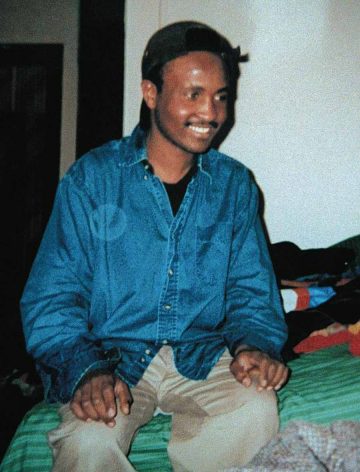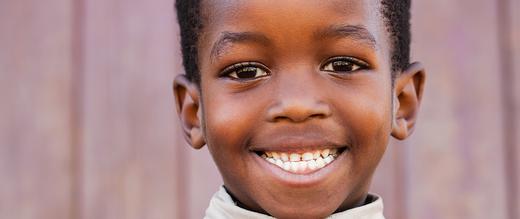The views expressed in our content reflect individual perspectives and do not represent the authoritative views of the Baha'i Faith.
As you can see from my photo, I’m a white guy—but I have an African-American grandson, and yes, we’ve had “the talk.”
You know the one I’m referring to, right? Bruce Springsteen exemplified it in a few short lines in his song “American Skin (41 Shots):”
41 shots, Lena gets her son ready for school
She says now on these streets Charles
You got to understand the rules
Promise me if an officer stops you’ll always be polite
Never ever run away and promise mama you’ll keep your hands in sight
Cause is it a gun?
Is it a knife?
Is it a wallet?
This is your life
It ain’t no secret (it ain’t no secret)
It ain’t no secret (it ain’t no secret)
No secret my friend
You can get killed just for living in your American skin.

Amadou Diallo
That powerful song, about the death of African-American Amadou Diallo at the hands of four New York plainclothes police detectives in 1999, whispers a warning to every white police officer and every citizen of color. It says: an unarmed black man named Amadou Diallo reached for his wallet, and the police were so frightened, so sure he had a gun hidden away somewhere, that they killed him. He had committed no crime.
Every parent and grandparent of a minority child, teenager or young adult holds this nightmare scenario in their mind’s eye: your son or grandson or even your granddaughter comes home from school or work or a date, and the police think he’s someone else, confront him and kill him. Mistaking a wallet or a cell phone for a weapon, they protect themselves first, following that cynical old adage: better to be judged by twelve than carried by six.
Amadou Diallo’s death inspired dozens of songs—and ultimately, an entire movement. If you listen to contemporary music, no doubt you’ve heard at least one of those songs. Wyclef Jean, Lauryn Hill, the rapper 88 Keys, Ziggy Marley, Erykah Badu and many others sang about Diallo, and the message did get across, to an entire generation of boys and young men and the people who love them. Yes, it took a while, and the deaths of several other young people of color, but after the death of Trayvon Martin in 2013, a new movement sprung up called Black Lives Matter.
BLM had its genesis in the work of three young women, black community organizers named Patrisse Cullors, Alicia Garza and Opal Tometi. Alicia Garza first wrote the phrase “Black Lives Matter” on Facebook after Trayvon Martin’s killer was acquitted, and Patrisse Cullors wrote the hashtag version when she began tweeting about the case. All three women used social media to start a new kind of movement for social justice. But interestingly, it really came about several years before when Patrisse Cullors began fighting for justice after her 19-year-old brother was brutalized by guards in Los Angeles County jails, and after the young black man Oscar Grant was killed by Bay Area Rapid Transit Police in Oakland in 2010.
Regardless of where you stand on the Black Lives Matter issue—which focuses on stopping state-sanctioned killings of people of color—you certainly have heard the call for justice from historically-marginalized minority communities. Regardless of your viewpoint on racial issues, you certainly believe in fairness and justice for everyone. Regardless of your political inclinations or your feelings about the police, you certainly don’t want anyone innocent to die.
So you can certainly understand, I’m sure, why my wife and I felt the need to have that talk with our black grandson. If you were in our shoes, you’d probably do exactly the same thing. He’s young, he’s in college, and like all young men he has a bit of brashness along with a highly-developed sense of justice and injustice. We could just imagine him getting pulled over by a police officer and saying or doing something that, shall we say, challenged the officer. We dreaded the potential consequences.
Also, I realized—with our three white sons, I just didn’t have that same level of fear and trepidation.
Don’t get me wrong—our grandson is respectful, kind and thoughtful. If you met him, you’d instantly like him. He spent his childhood in Ethiopia, and he has the kind, gentle nature many African Baha’is evince. So why am I worried? I’m worried, frankly, because despite our interracial family we still live in a racist society, a society that judges people first and foremost on the color of their skin.
Do you think that’s true? The Baha’i teachings certainly affirm it, saying that racism has now become “a spiritual disease:”
Racism is now tainted by its association with the horrors of the twentieth century to the degree that it has taken on something of the character of a spiritual disease. While surviving as a social attitude in many parts of the world—and as a blight on the lives of a significant segment of humankind—racial prejudice has become so universally condemned in principle that no body of people can any longer safely allow themselves to be identified with it.
It is not that a dark past has been erased and a new world of light has suddenly been born. Vast numbers of people continue to endure the effects of ingrained prejudices of ethnicity, gender, nation, caste and class. All the evidence indicates that such injustices will long persist as the institutions and standards that humanity is devising only slowly become empowered to construct a new order of relationships and to bring relief to the oppressed. – The Universal House of Justice, April 2002, To the World’s Religious Leaders, pp. 1-2.
So, with that in mind, let’s talk about “the talk”—and see if we can find a way to reduce the need to warn young people of color about their next interaction with the police.
You May Also Like
Comments

















to the narrative that stimulates it. A lot of us
are talking past each other
without listening well. Once we do listen and
think about it, the stalemate will go away.